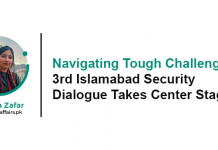
The concept of non-traditional security threats emerged after the end of cold war. The world shifted its order from bi-polarity to uni-polarity. This further highlighted the relevance of non-traditional security threats, which were present in the international system, but were not given much importance over traditional security threats. The non-traditional security threats include economic insecurity, environmental security, individual insecurity, political insecurity and social insecurity. However, dealing with these threats is different as traditional security threats are dealt with by the help of security measures and power maximization, which have been practiced for long.
Non-traditional security threats for a country can develop over time without any clear warning or a sign. It can emerge anytime in the shape of a pandemic, food shortage, water scarcity, climate change, economic war, population explosion, terrorism, etc. Dealing with such threats is not easy as no country is ever ready to combat them.
Similarly, Pakistan has been facing non-traditional security threats that have made it difficult for people and government to thrive and prosper. Being a developing country, Pakistan has to face multiple challenges and difficulties regarding these non-traditional security threats that affect its overall growth.
Pakistan is facing such issues as terrorism, overpopulation, political instability, economic challenges, climate change, smuggling, and more. It is clear that Pakistan has not been able to deal with these threats effectively as it simultaneously is busy dealing with traditional security issues. In order to deal with these non-traditional security threats, Pakistan must strengthen its civil, non-military institutions that can effectively deal with these issues. Political instability is a key aspect of the threats, and many analysis and vital decisions will be taken by these institutions.
The issue of terrorism is a challenge to the territorial integrity and state sovereignty. Terrorism has created civil unrest that has affected Pakistan’s internal security and its overall economic development. Insecurity within the state has halted social progress and development. Religious extremism has weakened the social fabric of the society, which has created religious intolerance. The scourge of terrorism must be tackled with proper strategies, made by civil and armed forces of the country.
Political instability is also part of non-traditional security threats in Pakistan. Political unrest within the state creates instability and power tussle within state institutions. This further hampers the state’s growth potential as the state becomes less able to deliver what its people needs and demands. Economic and developmental hurdles are created by political instability that does not allow state to prosper. Stability is vital for any country’s development and, unfortunately, this has not always been available in Pakistan in general and in all areas.
Another growing non-traditional security threat is the booming or exploding population growth. Pakistan has one of the fastest growing populations in the world. This unprecedented growth in population has given a massive amount of pressure on Pakistan’s economic resources and employment. In order to deal with the population boom, the government and civil society must push for spreading awareness about family planning in order to control and reduce the population growth.
The current corona virus pandemic has highlighted the importance of a sound health sector for the country, and all other countries. This pandemic has exposed international systems’ weaknesses to cope up with contagious viruses that are more deadly than a biological weapon. Countries need to build a strong defense against such global crises. Non-traditional security threats such as these must be dealt with urgently – and we must plan for how to handle the next attack, since scientists say this was not the last pandemic, maybe not even the worst.
Pakistan is one of the worst affected countries from climate change. It is also a kind of non-traditional security threat that has to be addressed otherwise the country could lose its natural resources that are essential for sustaining life. Rising sea levels and temperatures are putting a negative impact on its agricultural produce. Pakistan is also losing coastal land due to coastal erosion.
Finally, drug trafficking and smuggling are hurting the national economy and security. The rise in use of drugs among Pakistani youth is a threat to future generations of the country; if not stopped, or reduced, it could lead to havoc.
In a nutshell, like any other state, Pakistan is also vulnerable to non-traditional security threats. It is a need of the hour to address these issues and tackle multiple shortcomings timely. Pakistan’s geographical significance has attracted traditional security threats and it would not go Scot free by regards the non-traditional security either.
Zahid Hussain Jamro.
Writer recently completed BS-International Relations from National University of Modern Languages, Islamabad.




